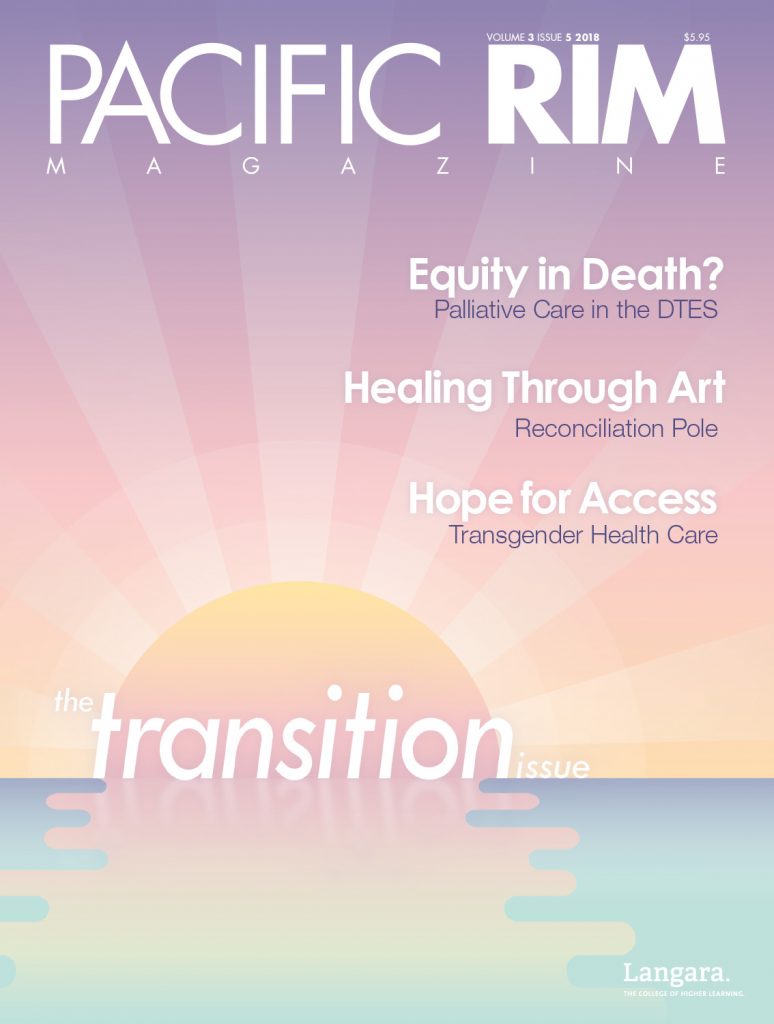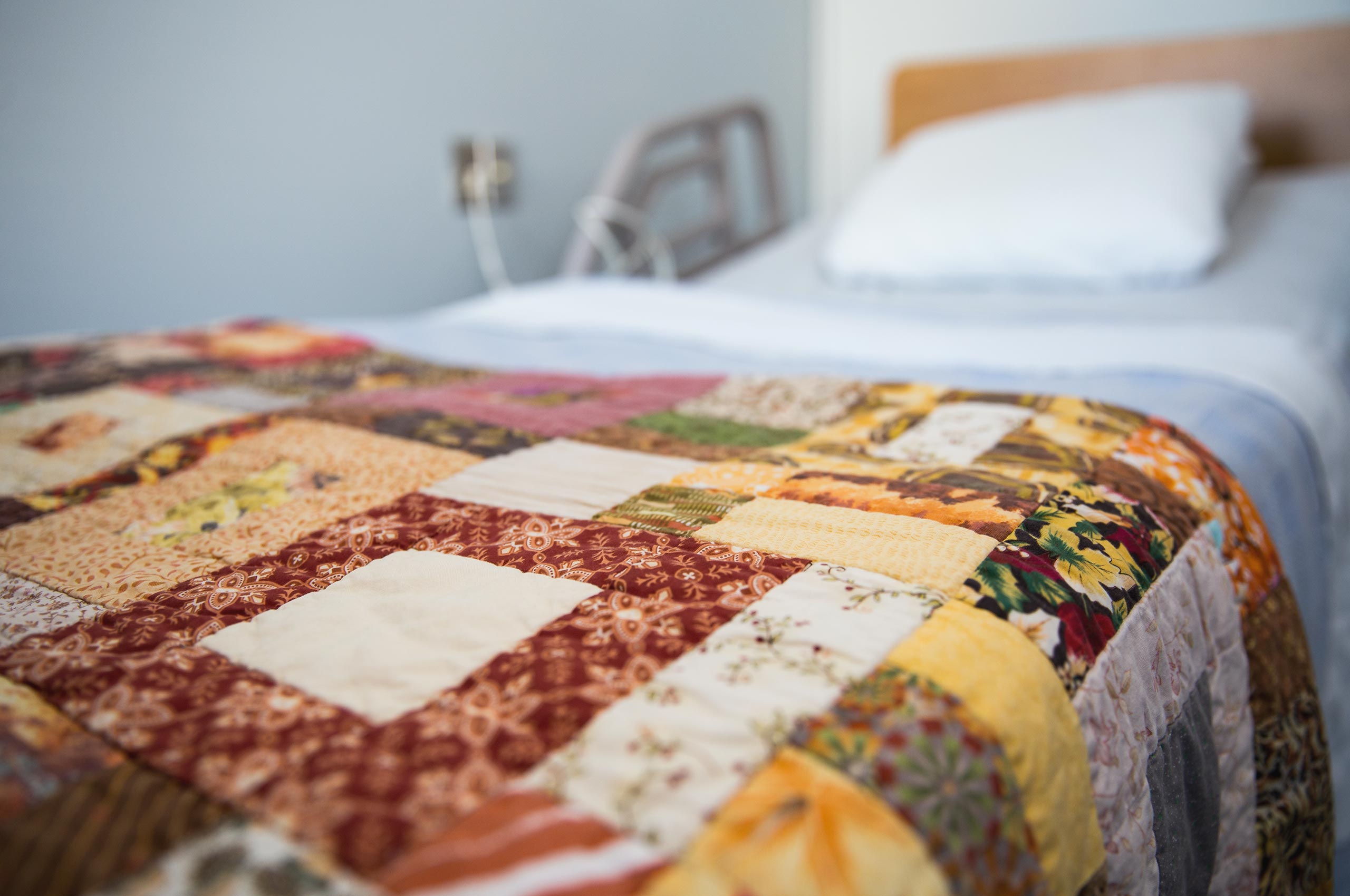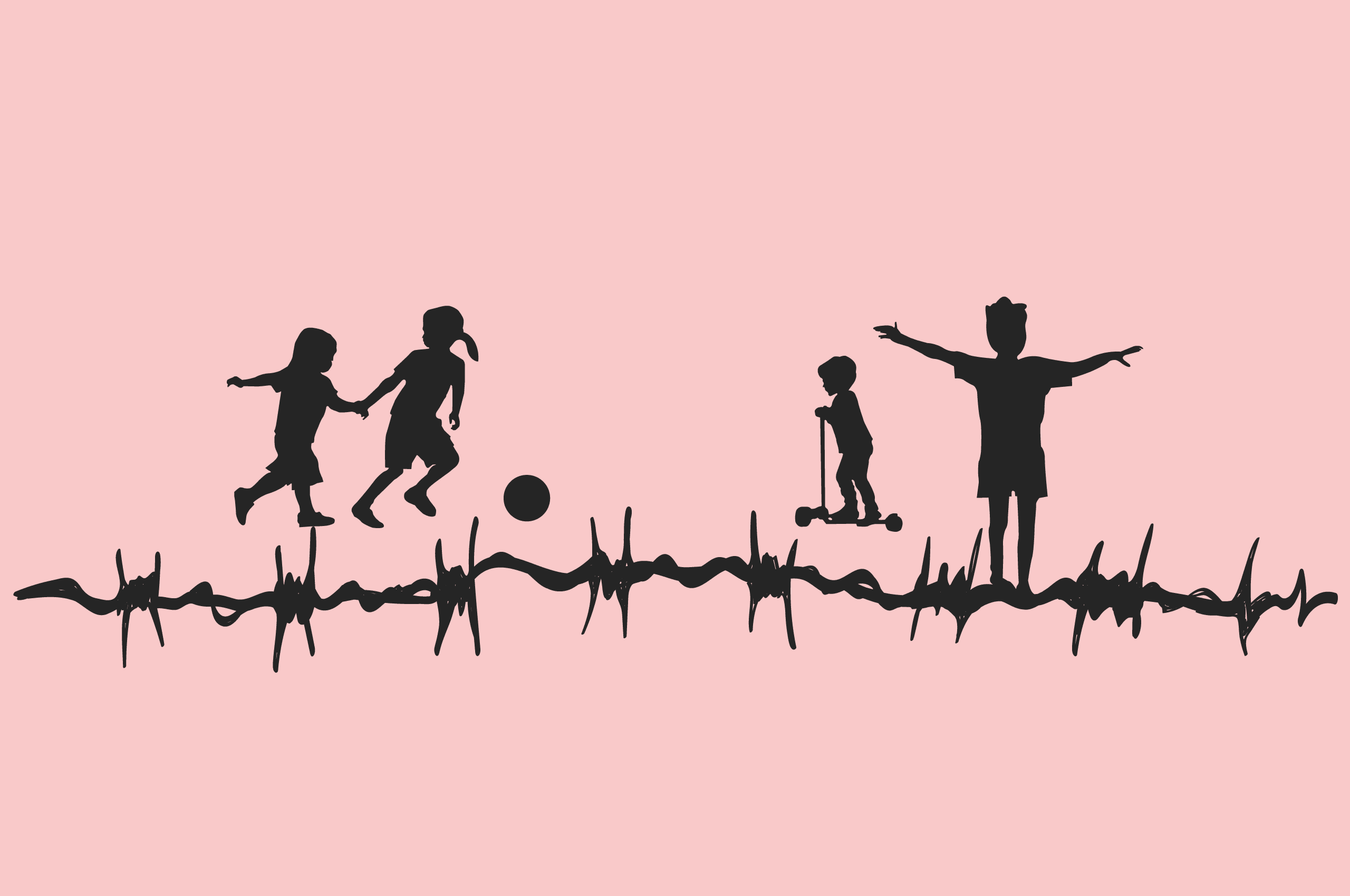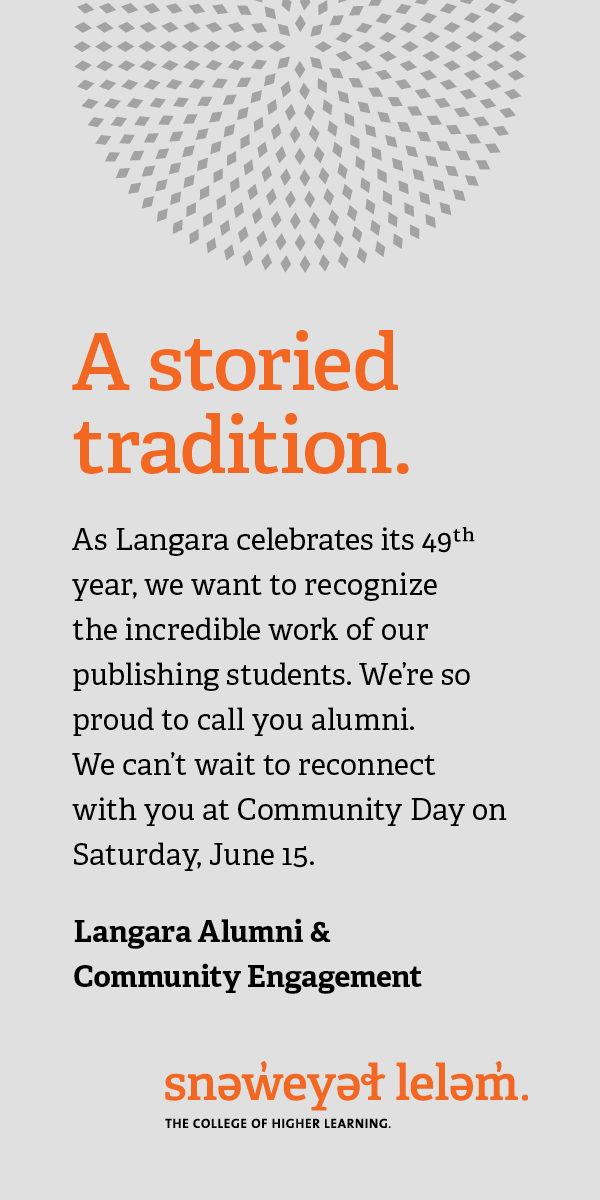“I always played sports with the guys at work. I put on some shoulder pads, a helmet, and some gloves to play road hockey. It was an epiphany that I was putting on a different suit of armour. I was putting on a different skin and it felt comfortable. I felt like I fit in. I felt male. That’s what set me off and why it didn’t happen until I was 52 years old,” recalls transgender BC radio broadcaster James Gardner on his decision to transition to a man seven years ago.
Transgender Folks
Transgender people—folks whose gender identity or gender expression differs from their assigned sex and gender at birth—face considerable barriers when accessing trans-competent primary care, assessments, hormone therapy, and gender-affirming surgeries. Canada’s publicly funded health care system, while not perfect, is deeply entrenched as a source of national pride. However, for transgender British Columbians, access to essential gender affirming procedures is anything but universal.
Hormone therapy and gender affirming procedures are considered life affirming and medically necessary by the World Professional Association for Transgender Health (WPATH). Steered by over 1,500 professionals, WPATH provides evidence based standards of care for health care providers around the world. “This is not cosmetic,” says Gardner. “For some [transgender people] it is life changing and life saving. There is a lot of suffering that is caused when you grow up in the wrong body. It causes depression, it causes isolation, and it’s hard to go out into the world without having to take your body with you.” Gardner adds that it is important to remember that not all transgender people wish to have surgery. Although, for some individuals, gender affirmation procedures are essential for well-being.
Gender Reassignment Surgery (GRS) Montréal is currently the only clinic in Canada that performs critical “lower” male-to-female (MTF) and female-to-male (FTM) gender affirmation surgeries. With a team of three trained surgeons, GRS Montréal is the only choice for BC residents who wish to have the out-of-province surgery covered by the province’s Medical Services Plan (MSP). For individuals requiring “upper” chest masculinizing and breast construction procedures, there are just five surgeons in BC who perform them.
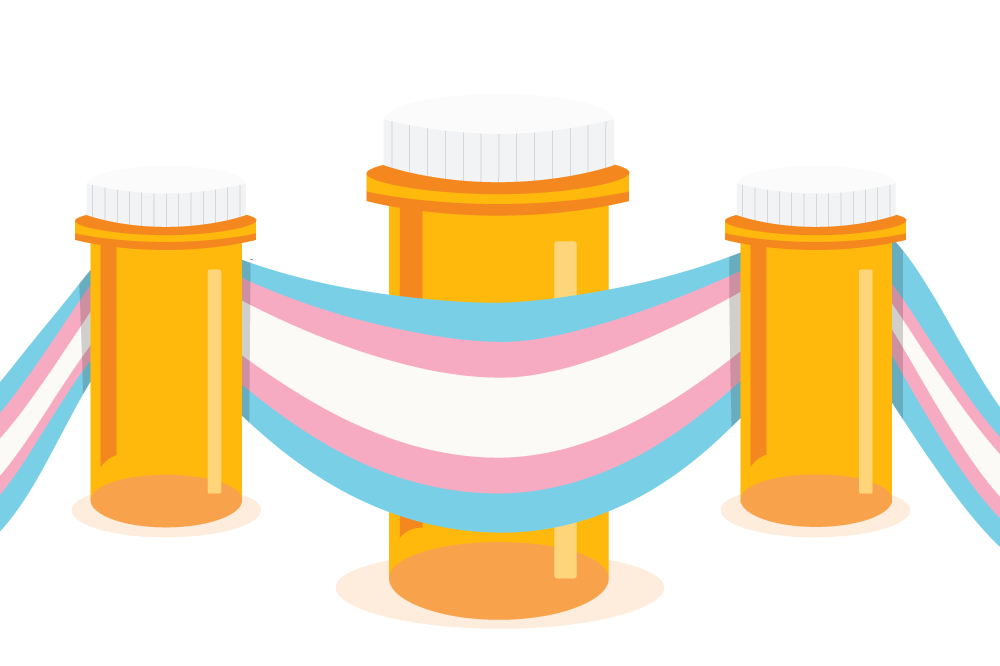
Those within the transgender community who wish to have surgery are faced with a complicated assessment and referral process. There are also lengthy waitlists due to a high demand for lower body surgery from individuals across the country. Additionally, there is a limited number of upper body surgeons on the West Coast.
For residents of BC, the first step in receiving MSP funding for gender affirmation surgery is to have patients work with a primary care provider who is often a family doctor. The primary care provider guides patients through hormone therapy and refers them to a qualified surgical readiness assessor. The assessor ensures that all patients are prepared for surgery and will have the best possible post-operation outcome. However, finding a trans-competent physician can be difficult, further impeding access to vital procedures.
Unfortunately, primary care providers who specialize in transgender health care are not common in BC, particularly outside of major urban areas. Primary care providers may not have all the answers for transgender health inquiries; they may lack experience and understanding of transgender patients and their medical concerns. A recent study by the Stigma and Resilience Among Vulnerable Youth Centre (SARAVYC) found that patients often have to “self-advocate” by doing their own research about transgender health-related procedures, and often depend on others that have accessed transgender health care.
“Primary care providers are so essential because they are the first point of contact in the health care system—they are the people that are going to be able to advocate for you—to have a provider that is fighting on your behalf if there are any obstacles that are going to come up,” says Dr Hélène Frohard-Dourlent, a member of the SARAVYC team at UBC’s School of Nursing.
Complications also arise during the surgical readiness assessment, prior to any upper or lower procedure. Assessments are conducted in line with the WPATH Standards of Care and are a requirement enforced by surgeons prior to procedures. However, the assessment criteria can be diverse and dependent on the assessor. “Every assessor has a different idea of what they consider real-life experiences, which is one of the qualifications for having gender confirmation surgery,” explains Nicola Spurling, transgender rights activist and president of the Tri-Cities Pride Society. “My assessor viewed that as being on hormones… whereas other assessors may say that you must be dressing as a woman, which then brings up the question of how does a woman dress?”
The SARAVYC report, titled “Experiences with Gender-Affirming Surgery in British Columbia,” found that there is a lack of clarity in the assessment process. Forty per cent of respondents had a challenge finding an assessor in BC and a wide variation was seen in standards for assessments, with many respondents having mixed experiences in terms of how useful they found the assessments. “I think the lack of consistency in the province is one of the reasons why navigation continues to be really complicated,” says Dr Frohard-Dourlent, co-author of the report.
The transgender and non-gender conforming community point to the need for more support and coordination on the West Coast. “They should be doing surgery in BC. Montréal is far away and there is a geographical barrier,” says Gardner, who has navigated the pathway to surgery at GRS Montréal. Spurling adds, “If you were to have post-surgery complications or a fever in the middle of the night, you can’t go see a trans-friendly nurse; you have to go to the emergency room. And there are so many horror stories about trans people and how they are dealt with in our medical system at large.”
Access to Care
Even when patients have successfully received treatment at GRS Montréal, they are faced with costs that are not covered by BC’s MSP. Transportation to and from Québec for the surgery and any pre-operation evaluations are not covered by the public health plan. Further, any expenses required for recovery, but not a part of the hospitalization period, are not publicly covered.
Fortunately, Hope Air, a non-profit organization that covers airfare costs for low-income individuals seeking medical care away from home, has donated airline tickets to transgender people in need. For many transgender individuals in BC, Hope Air is the only option to get to out-of-province appointments and procedures. However, donations are not guaranteed. “[Hope Air] is a life-saving service because they allow people to get access to Montréal, but even beyond having to pay for your own ticket, they are very intense, significant procedures,” says Dr Frohard-Dourlent, referring to the challenging recovery period that occurs when individuals return to BC post-operation.
Access to health care that sufficiently meets the needs of transgender and non-gender conforming folks is mired with a daunting array of hurdles. Luckily, BC is helping to lead the way. More transgender health services and gender affirming care will soon be accessible on the West Coast.
Trans Care BC
In 2015, the Provincial Health Services Authority (PHSA) consulted the transgender community, clinical experts, and stakeholders. After careful consideration PHSA created Trans Care BC, a program dedicated to enhancing the synchronization of transgender health services and support across the province. According to their mission, Trans Care BC has a coordinating team of navigators, which includes nurses and a part-time physician, who work alongside service providers and community contacts from across BC to help people find care and support as close to home as possible. The Trans Care BC program creates a central organizing body, where health professionals and transgender individuals can access transgender health information by telephone, in person, or online, via the Transgender Health Information Program website.
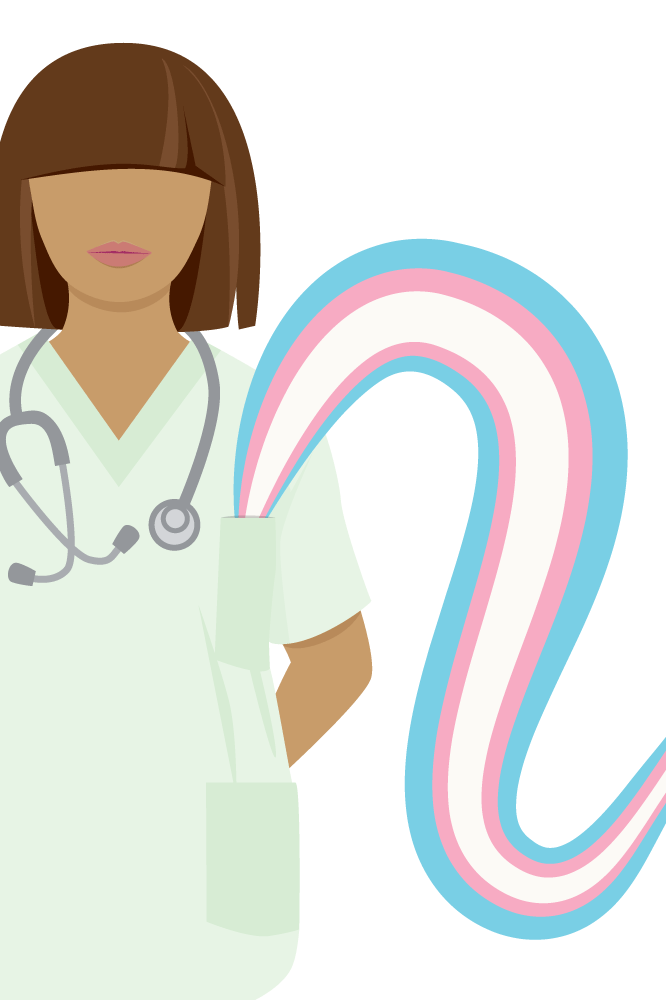
Trans Care BC’s vision seeks to strengthen existing health services, including the creation of new ones that will improve access for transgender people. According to Lorraine Grieves, Trans Care BC provincial program director, the program is doing some significant groundwork to reduce wait times and improve access for upper surgeries conducted in BC. “Trans Care BC is working with existing surgeons who currently provide [upper surgeries], while streamlining and making improvements to the referral process, making sure there is consistency in some of their practices,” says Grieves. As of January 1, 2018, Trans Care BC has taken on the responsibility of coordinating chest and breast gender affirming surgeries, previously organized by Vancouver cosmetic surgeon, Dr Cameron Bowman.
Additionally, Trans Care BC has been able to work with the Ministry of Health and local surgeons to add extra surgeries, allowing waitlists to move at a swifter pace. “We are also training more surgeons this year to take on upper body surgeries, so within the next 12–18 months we will see more surgeons offering that care and in more regions than the current two regions that have upper body surgeries. That is the concrete, short-term activity that we are working on,” adds Grieves.
Looking Forward
The long-term goal for Trans Care BC is to have a surgical centre created for Western Canada, which will address many of the complications with out-of-province procedures. The program has submitted recommendations to the Ministry of Health on how a comprehensive surgical program could provide better access for BC residents. However, this is a distant prospect. The program remains focused on infrastructure to enhance access in the interim, which will ideally serve as a model for other provinces to replicate if successful.
Although the program is still in its relative infancy, many community members see it as a step in the right direction. Dr Frohard-Dourlent sees the creation of a central coordinating body as a symbolic achievement and one that will, hopefully, have a chain reaction across the country. “The positive thing is that the very creation of Trans Care BC sends the message that the province—the Ministry of Health—is aware of the specific needs of this population and is committed to financially supporting changes surrounding transgender health in BC. And I think that’s not something we have seen in other parts of Canada.”
For those who have been transgender health navigation pioneers, a comprehensive surgical centre in Western Canada is a bittersweet dream. “I’ll probably be on my way by then, but I hope future generations can have a centre here in BC and have the capacity to have people go in from day one to get hormone treatment, to get counselling, to have regular physicals, to have people working with them through the surgical process, to have their assessments done, to have their surgeries, and to have a one-stop shop,” says a hopeful Gardner. “For most of us we wish we had it yesterday, but I think we are getting there.”






